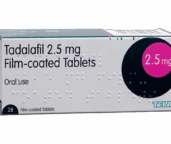How long do Tadalafil side effects last?
Most Tadalafil side effects, such as headache or flushing, last a few hours at most.
Because Tadalafil stays in the body for up to 36 hours, mild side effects can occasionally last a little longer, but they usually settle on their own.
If you experience ongoing or severe side effects, stop taking Tadalafil and speak to a healthcare professional.
Can Tadalafil cause vision problems?
Some people may notice mild, temporary visual changes, such as blurred vision or a blue tint to their sight.
This is uncommon and typically short-lived.
Very rarely, Tadalafil can cause sudden vision loss due to a condition called non-arteritic anterior ischaemic optic neuropathy (NAION).
If you experience sudden vision changes, stop taking Tadalafil and seek urgent medical help.
Is Tadalafil safe for people with heart problems?
Tadalafil is generally safe for people with stable heart conditions, but it must be used with caution.
You should not take Tadalafil if you use nitrate medicines or have had a recent heart attack or stroke.
Always speak to your GP or specialist before using Tadalafil if you have any form of heart disease.
Does Tadalafil affect fertility?
There is no evidence that Tadalafil affects sperm quality or fertility in men.
It simply works by improving blood flow to help achieve an erection – it does not influence hormones or sperm production.




